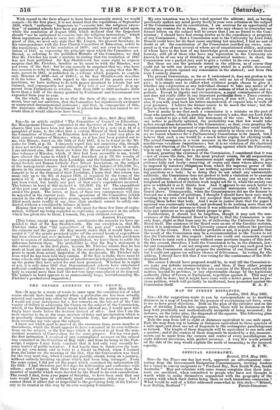17 Saddle Row, 30th May 1851.
Srn—In an article entitled "The Committee of Council on Education : the Management Clauses " contained in the Spectator of the 25th instant, I observe that you have been led into an error of fact by a note on p. 44 of a pamphlet of mine, to the effect that a certain Minute of their Lordships of the Committee of Council on Education had never yet found any place in their annual volumes of Minutes ; when, as it has just been pointed out to i me, this Minute, dated on the 10th of July 1847, is to be found in the Mi- nutes for 1846, at p. 33. I sincerely regret this not surprising slip, though it does not involve any material alteration of the context where it occurs. I am informed also, that there are before the House of Commons some fur- ther volumes of Minutes, which, if they had been accessible to me, would have altered the terms in which I have described (at p. 78) the results of the correspondence between their Lordships and the Committees of the Na- tional Society and Roman Catholic Poor School Association, on the subject of the management clauses. And with ree'ard to the balance of 251,1581. '7s., shown in the statement (at p. 80) copied from Mr. Henley's return to Par- liament to be at the disposal of their Lordships, I learn that this return was made only up to the 8th of August 1850, as required by the terms of the motion for it. At that date, the grant (125,0000 for the year 1850-51 had just been voted, but hardly any part of that year's expenditure incurred. The balance in hand at this moment is 131,5941. 13s. 4d. The expenditure of the past year rather exceeded the estimate, and very considerably ex- ceeded the grant. The latter, at least, of these two consequences will also be-sepeated in the current year. The operations of the Committee (which consist in the offer of prospective grants, upon conditions which may be ful- filled much more readily at one, time than another) cannot be safely con- ducted without a considerable balance in hand.
Hoping that you will indulge me with space for these few lines of expla- nation, without my being regarded as expressing acquiescence in the article which has given rise to them, I remain, Sir, your obedient servant,
JOSEPH Fserenest.
[This letter except upon one point, corroborates the remarks we have ap- pended to that of Sir Kay Shuttleworth. The one exception is, that Mr. Fletcher states that "the expenditure of the past year" exceeded both the estimate and the grant : Sir Kay merely states that it would have ex- ceeded it "if the grants promised under all the several heads of expenditure had been claimed and were included" in the statement. As both gentlemen refer to sources of information yet unpublished, we leave them to settle the difference between them. The probability is, that Sir Kay's statement is the correct one ; in the first place, because Mr. Fletcher admits that he has made at least one mistake already ; in the second place, because Sir Kay ap- pears to speak from actual inspection of the documents, Mr. Fletcher only from what he has been told they contain. If Sir Kay is right, there must be some schools still too apprehensive of interference in religious matters to take up the grants they have asked for and been promised. Whether he is right or not, it is only since 1849 that Denominational schools have entertained sufficient confidence in the non-interference of the Committee to enable that body to expend more than half the not very large sums placed at its disposal. The balance in hand appears to us unnecessarily large, notwithstanding Mr. Fletcher's goodnatured suggestion.]


























 Previous page
Previous page